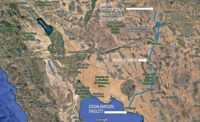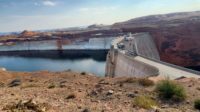Arizona officials voted to advance a $5.5-billion plan to build a water desalination plant in Mexico, as well as a 200-mile pipeline and associated infrastructure as part of a state effort to address its drought-driven water uncertainty. But growing controversy around the plan and the method of implementation threatens to derail the proposal.
A project team led by Israel-based desalination plant operator IDE Technologies is developing the plan, which calls for construction of water intakes and the plant on the Sea of Cortez in Puerto Peñasco, Mexico, plus a series of pumps and pipeline that would transport drinking water across the U.S. border to a reservoir west of Phoenix.
The Arizona Water Infrastructure Finance Authority would then purchase up to 1 million acre-ft of water per year from the plant. Its board voted 9-0 on Dec. 20 to direct staff to conduct an analysis of IDE’s proposal and make a recommendation on the plan.
The agency was established by state legislation signed by Gov. Doug Ducey (R) this year.
IDE says the plant could supply up to 3 million households—more than the 2.6 million households currently in Arizona. It would initially supply less water per year, about 300,000 acre-ft, according to the company.
In its submission to state officials, the company said it has built, owns and operates 450 desalination plants in more than 40 countries. Its desalination plants use a reverse osmosis process to remove salt, bacteria and other impurities from seawater, said IDE, adding that about half the water that enters the plant from the sea becomes fresh drinking water.
IDE aims to begin operations at the plant by the end of 2027.
The proposal still requires more review. If authority staff recommend that its board proceed with the plan, a nonbinding term sheet would be negotiated with IDE. The terms would then be subject to a board vote, in addition to required approvals from both the U.S. and Mexico governments.
Ahead of the Dec. 20 vote, however, speakers at a public meeting shared concerns over a variety of issues related to the plan.
Jennifer Martin, a program manager with Sierra Club’s Arizona chapter, said desalination “is just not sustainable” because of high energy use associated with the process, and the large amount of brine produced as a byproduct. Additionally, she said the pipeline would cross the protected Organ Mountains-Desert Peaks National Monument.
IDE said it is able to comply with “the strictest” environmental standards. At its Carlsbad, Calif., operating plant, the company adheres to state regulations by using state-of-the-art technology and design practices to reduce electrical demand.
Other commenters raised concerns about details of a potential contract, such as the state’s obligation to cover costs, and what happens during surplus water years and the price of water purchased at the plant. State Sen. Lisa Otondo (D) said it may cost $3,000 or more per acre-ft of water.
Otondo was also one of several commenters who questioned the process the state had used so far in working with IDE.
Warren Tenney, executive director of the Arizona Municipal Water Users Association, called for more transparency in the process, saying it seemed the deal had already been worked on “behind closed doors.” Lihy Teuerstein, CEO of IDE’s water assets unit, said during her pitch at the meeting that the team had already been working on the project for three years.
“This may be the best project out there,” Tenney said. “But the pressure under which the [authority] board is being asked to rush it is raising negative perceptions which could taint both the project and the [agency's] long term success.”
Board Chair David Beckham said during the meeting that moving forward with this project would not prevent the state from pursuing other water projects.






Post a comment to this article
Report Abusive Comment